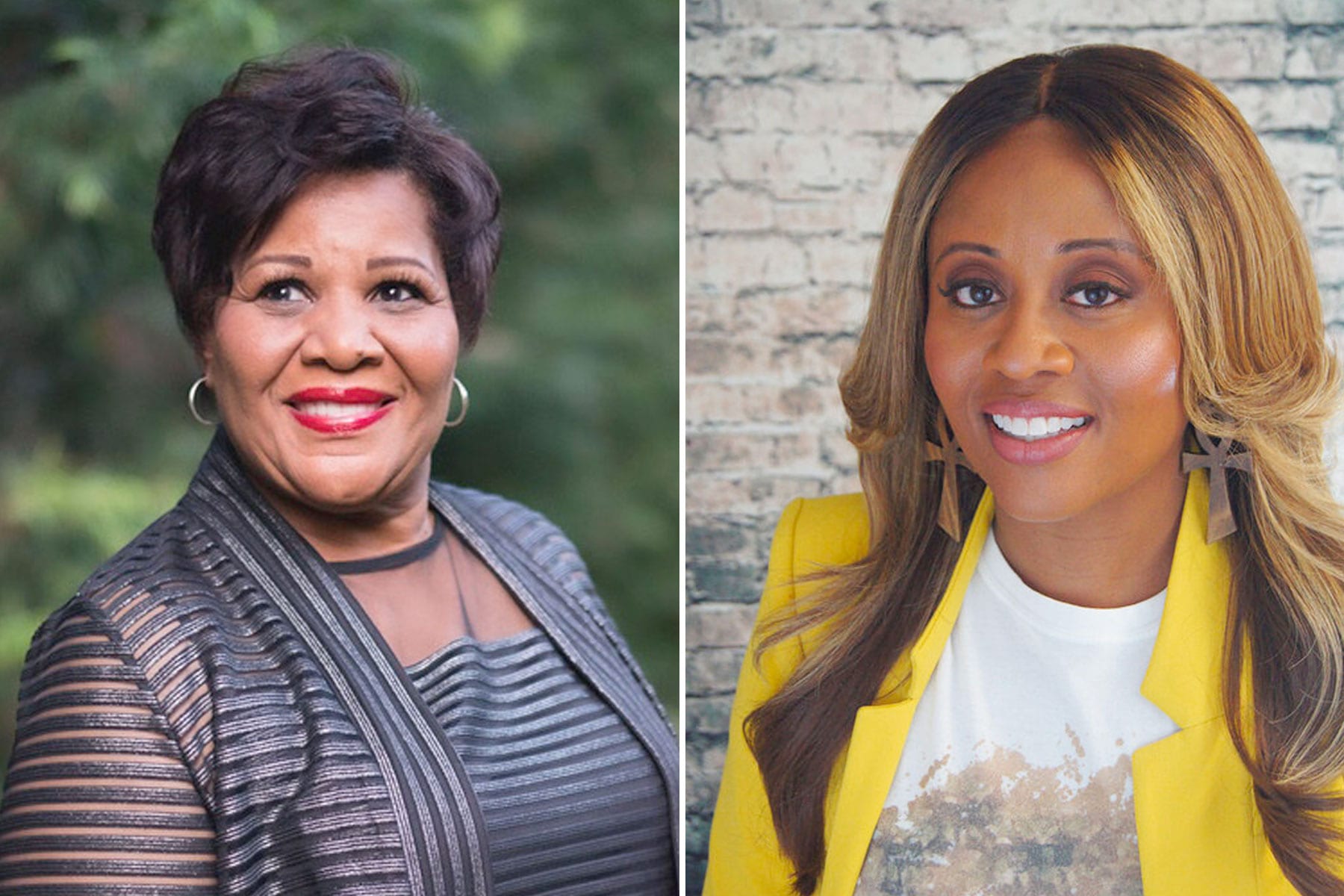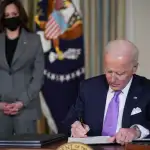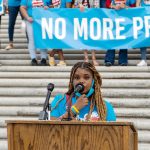In the final hours of President Donald Trump’s presidency, Syrita Steib got the call. She was fast asleep — as the mother of a 7-week-old, when her baby sleeps, she sleeps. Steib and her wife wondered: Who in the world would call at midnight?
On the phone, an attorney told Steib that Trump had granted her a full pardon for arson charges. Steib had been out of prison since 2009, but the pardon still had immediate impact.
For the last two decades, even while incarcerated, Steib has been making payments toward the nearly $2 million in restitution fees that accompanied her sentence. When in conversations with her now-wife, Steib warned her about the exorbitant fee she owed the government. “It happened at 19, do you still want to marry me? We can sign a prenup,” she recalled saying. For years, Steib has also worried about how she could leave money for her 9-year-old if something ever happened to her — the government had seized her tax returns in the past.
With the pardon, those restitution fees vanished.
“I’m not really emotional in the sense of I’m jumping up and down and I’m crying or whatever,” Steib said. “I was extremely happy, but I think that it still hasn’t fully sunk in all the way. It still doesn’t seem real or tangible that it’s not time for me to make my restitution payment yet.”
Steib was among more than 140 people, 23 of them women, who were granted clemency in the final days and hours of the Trump administration. Over four years, Trump pardoned or commuted 237 sentences. Women made up approximately 15 percent of those successful clemency recipients, which include commutations — or shortened sentences — or full pardons, which vacate any ongoing or past legal consequences. Women are the fastest-growing group behind bars, increasing by 700 percent since 1980, a rate of growth that is double that of men, who make up the overwhelming majority of the U.S. incarcerated population.
In interviews with The 19th, three women who have received clemency said that although presidential pardons are a tool to make a dent in mass incarceration, the process as a whole is broken. Each of the three women were involved in championing the First Step Act, bipartisan legislation Trump signed in December 2018 that reduced federal sentences and led to at least 3,100 releases from the federal system. Still, they noted that the act is true to its name — a literal first step. With the Biden administration in office, women are demanding more far-reaching, subsequent steps to prison reform and the clemency process.
“[The Biden administration has] a good opportunity to be able to fix it because let’s be honest: The Democrats are in control in the House and in the Senate,” Steib said. “I don’t know, the jury’s still out, I’m gonna just say that.”
Amy Povah, a clemency advocate whose sentence for drug-related conspiracy was commuted by President Bill Clinton and fully pardoned by Trump, didn’t apply for her most recent pardon. Povah said she was told in the last six months that Trump wanted to pardon formerly incarcerated people who helped with the campaign to get the First Step Act passed. She didn’t fill out any forms — she just wrote down what she’d done in the years since Clinton commuted her sentence in 2000 and what she did to help with the legislation.
Her pardon is “bittersweet,” Povah said, because there are so many women she’s fighting to get released: Like Michelle West, who had no priors, and has been in prison since 1993, serving two life sentences plus 50 years at a federal prison on drug conspiracy and murder charges even though the gunman, who confessed, never went to prison.
“There’s so many broken hearts, there’s many more broken hearts than happy hearts right now, including mine,” Povah said. “I got a pardon, I’ll be honest with you, I would give it back in a heartbeat if Michelle West could come home. It doesn’t change my life.”
Povah wants to see widespread categorical clemency: Instead of being examined on a case-by-case-basis, people would be eligible depending on certain offenses or experiences such as time served or being a mentor.
And even with her decades of work as founder of Clemency for All Non-violent Drug Offenders, or CAN-DO, Povah said the clemency process remains a “black hole” — there’s no way to know how it actually unfolds. That won’t change until the Office of the Pardon Attorney, which reviews clemency applications, is moved out of the Department of Justice and becomes independent, she said. Povah said the Office of the Pardon Attorney also needs to diversify the staff who are reviewing clemency applications. Many are former prosecutors who may not be inclined to trigger releases, she said.
“What we’re asking for is that you just take the [Office of the Pardon Attorney] out of DOJ, separate the two … and staff it with a cross pollination of different mindsets, different intellect, so you have former prosecutors, but you also have public defenders … maybe some criminal defense attorneys, one, two or more, formerly incarcerated people, a former judge or two,” she said.
Steib, whose life was drastically changed by her pardon, is similarly critical of the process, including the way it seems to reward people like herself — formerly incarcerated women turned advocates. She founded Operation Restoration, a nonprofit with a mission to support women and girls impacted by incarceration, and has helped ban Louisiana colleges and universities from asking about criminal history during admissions. But Steib said her advocacy work does not make her any more deserving of a pardon. Being in proximity to people who had the power to grant her pardon, she said, is “without a shadow of a doubt” why she’s been freed from her fines.
In 2018, Trump hosted a prison reform summit at the White House shortly after the House Judiciary Committee passed the First Step Act. Steib was in the audience — at the time she was a policy consultant for Cut 50 (now Dream Corps Justice), a bipartisan nonprofit aimed at reducing incarceration levels. She watched as Rick Perry, who was elected governor of Texas while Steib’s case moved through federal courts in that state, spoke on the panel. He reflected on Texas’ history of putting young people in prison for long periods of time following tough-on-crime federal statutes like the 1994 crime bill authored by now-President Joe Biden.
“But, the result was that we were ruining a lot of lives — lives we didn’t have to ruin,” Perry said then.
Steib felt like he was talking directly to her: She was 19 when she was sentenced for arson charges related to the burglary of a Texas car dealership. After the summit, she said she walked up to Perry and told him her story. Not long after, attorneys started working on her clemency application, something she didn’t even think was available to her because she was already out of prison.
Now that she’s received a pardon, she’s still processing what it means. On one hand she is extremely grateful. But she’s also unsatisfied. What about other women who have served their time and live with crippling debt like Steib did?
“I think that this whole premise of we need to be deemed worthy or forgiven is just another way of creating classes and classism,” she said. “It’s like, ‘Oh you’re better than this particular person who had this particular thing, so we’re gonna give you this treat or this toy.’”
Alice Johnson, the first woman (and second person overall) to receive a commuted sentence from Trump, has personally been to the White House to discuss clemency applications. She’s listed in White House clemency announcements as a swaying force for several people who’ve received clemency in the last four years, including women with whom she’d been imprisoned.
Johnson, like many of the women who’ve received clemency, has dedicated her life to criminal justice reform. Last year, she founded Taking Action for Good, a nonprofit that focuses on clemency and reentry.
“You can’t just help people become free, and then say, ‘Go have a good life,’” Johnson said. “You can’t just celebrate them being free, because I saw the obstacles that I had.”
Johnson still had five years of supervised release when she left prison. One of the stipulations was that she could not be in contact with ex-felons, which made her criminal justice reform work difficult. She felt like she was in “invisible shackles,” which Trump broke in August 2020 when he granted Johnson a full pardon one day after she spoke at the 2020 Republican National Convention. In her remarks, she advocated for fair and just sentencing, uplifted her fight to get more prisoners released, and thanked Trump for signing the First Step Act.
The first time Johnson was ever convicted of a crime, she was sentenced to life in prison plus 25 years for a nonviolent drug offense in the 1990s. There is no parole in the federal system, so her family prepared to never see her again outside of prison walls. As Brittany Barnett, one of Johnson’s attorneys, pointed out in an interview, Johnson was serving the same amount of time as the Unabomber.
Her case had caught the attention of Kim Kardashian West, a reality TV star turned criminal justice advocate. In May 2018, Kardashian West met with Trump, and she tweeted that she felt optimistic that Johnson would get a second chance at life.
When Trump signed Johnson’s commutation order in June 2018, she was focused on getting hamburgers, which were served only once a week at the Federal Correctional Institute Aliceville in Alabama. (“I wasn’t going to miss that,” she said.) When she got to the cafeteria, she heard her name over the intercom. She thought it was for a routine attorney call. Instead, it was Kardashian West informing her that she was free.
Johnson, who spent decades helping fellow prisoners write legal petitions, said what came next felt like an earthquake: over 1,000 women placed on lockdown screaming, crying, rattling cups along cell bars, applauding, and begging Johnson not to forget about them as she walked out into the world a free woman.
“I carry that image in my heart,” Johnson said. “Wherever I go, whatever platform I can use to lift my voice up, it lifts their voices too. When people see my face they are reminded that there are many other faces that they might not see.”
Johnson’s attorney, Barnett, co-founded the Buried Alive Project, an advocacy organization fighting to free incarcerated people serving life without parole for drug charges. Barnett also hopes the Biden-Harris administration and the slight Democratic majority in Congress can reinstate parole at the federal level. (In 1984, Congress eliminated parole for federal prisoners with the Sentencing Reform Act.) Johnson agrees.
“Many people think that when you have a life without the possibility of parole like I did, that I had committed a very heinous crime,” Johnson said. “But it meant that there is no parole in the federal system, that people are not redeemable, that you should never take a second look at this person who has totally rehabilitated and poses no safety risks.”






